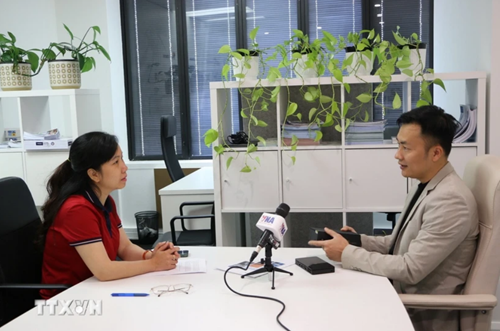The resolution not only sets out a comprehensive strategy to propel Vietnam further in the digital era but also plays a key role in creating momentum, providing directions, and mobilizing resources to achieve the necessary breakthroughs, said Nguyen Tuan Nghia, an expert in artificial intelligence (AI), who was honored with the title of Fellow of Engineers Australia by the Engineers Australia, and a member of the Vietnam-Australia Scholars & Experts Association (VASEA).
    |
 |
|
Nguyen Tuan Nghia (right) has an interview with VNA correspondent in Australia. |
In the current phase, effectively implementing the resolution will help Vietnam escape the middle-income trap, build a knowledge-based economy, and rise to become a technology-driven and innovative nation, Nghia stated.
According to the expert, Vietnam currently has an advantage of being a rapidly growing digital market in areas such as financial technology, e-commerce, artificial intelligence (AI), and telecommunications, with large tech corporations like Viettel, VNPT, FPT, and VNG investing heavily in digital transformation, AI, big data, and cloud computing. The government is also accelerating the development of e-government and digital infrastructure, helping Vietnam improve its ranking in the United Nations e-government index.
However, Nghia pointed out that Vietnam lacks high-tech talent, particularly in core areas such as AI, semiconductor chips, and cybersecurity, while investment in research and development (R&D) remains low and has not yet reached the average level of developed countries, and support policies for tech enterprises are also not strong enough.
Therefore, he stated that while the goals set by Resolution 57 are achievable, there needs to be a significant breakthrough in R&D investment, institutional reform, and workforce training.
The expert proposed Vietnam increase investment in R&D to 2-3% of GDP, with a focus on AI, semiconductor chips, biotechnology, and renewable energy, promote high-tech talent training, and collaborate with top global universities to develop specialized education programs. Additionally, he suggested attracting investment from major tech corporations, creating favorable conditions for them to establish R&D centers in Vietnam, and enhancing international cooperation, especially with leading science and technology countries like the U.S., Japan, the Republic of Korea, and the European Union (E.U.).
He held that Vietnam has many sectors with the potential for significant breakthroughs, which could help transform the country into a technology and innovation hub in the region, including digital technology and AI; semiconductor and microchip industries; financial technology (Fintech) and the digital economy; biotechnology (Biotech) and digital healthcare; the Internet of Things (IoT) and automation industries; as well as renewable energy and environmental technologies.
Source: VNA